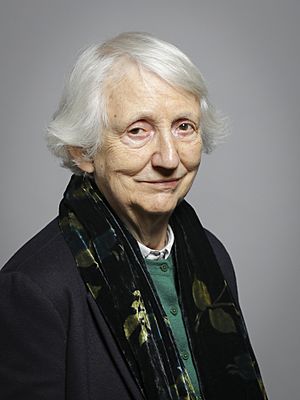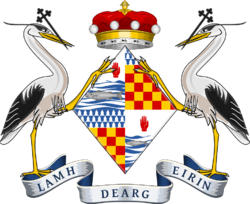Onora O'Neill facts for kids
Quick facts for kids
The Baroness O'Neill of Bengarve
|
|
|---|---|
 |
|
| President of the British Academy | |
| In office 2005–2009 |
|
| Preceded by | Garry Runciman, 3rd Viscount Runciman of Doxford |
| Succeeded by | Sir Adam Roberts |
| 10th Principal of Newnham College, Cambridge | |
| In office 1992–2006 |
|
| Preceded by | Sheila Browne |
| Succeeded by | Patricia Hodgson |
| Member of the House of Lords Lord Temporal |
|
| Assumed office 25 February 1999 Life peerage |
|
| Personal details | |
| Born |
Onora Sylvia O'Neill
23 August 1941 Aughafatten, Northern Ireland, United Kingdom |
| Nationality | British |
| Political party | None (crossbencher) |
| Education | St Paul's Girls' School |
| Alma mater | Somerville College, Oxford Harvard University |
| Occupation | Philosopher and politician |
| Awards |
|
|
Philosophy career |
|
| Era | Contemporary philosophy |
| Region | Western philosophy |
| School | Analytic philosophy |
|
Main interests
|
|
|
Influences
|
|
|
Influenced
|
|
Onora Sylvia O'Neill, Baroness O'Neill of Bengarve (born 23 August 1941) is a famous British philosopher. She is also a member of the House of Lords, which is part of the UK Parliament. She is known as a "crossbencher," meaning she doesn't belong to a specific political party.
Contents
Early Life and Education
Onora Sylvia O'Neill was born on August 23, 1941, in Aughafatten, Northern Ireland. Her father was Sir Con O'Neill, a diplomat.
She studied in Germany for a while. Later, she attended St Paul's Girls' School in London. She then went to Somerville College, Oxford, where she studied philosophy, psychology, and how the body works. After Oxford, she earned a special degree called a doctorate from Harvard University in the United States. Her supervisor there was a well-known philosopher named John Rawls.
Career Highlights
In the 1970s, Onora O'Neill taught at Barnard College in New York City. This college is part of Columbia University.
In 1977, she moved back to Britain. She started working at the University of Essex. She became a Professor of Philosophy there. In 1992, she became the Principal of Newnham College, Cambridge, which is a college at the University of Cambridge.
She is now an Emeritus Professor of Philosophy at the University of Cambridge. This means she is a retired professor who is still highly respected. From 2005 to 2009, she was the President of the British Academy. She also led the Nuffield Foundation from 1998 to 2010.
Baroness O'Neill gave important talks called the Gifford Lectures at the University of Edinburgh. She spoke about "Autonomy and Trust in Bioethics" in 2001. She gave another series of talks in 2013. From 2004 to 2006, she was the President of the British Philosophical Association. She also held a special position at the University of Amsterdam in 2013.
She was the Principal of Newnham College, Cambridge, until October 2006. From 2012 to 2016, she was the head of the Equality and Human Rights Commission. This group works to protect people's rights and ensure fairness. Her work has earned her many awards, including the Berggruen Prize.
Philosophy and Ideas
Onora O'Neill has written many books and articles. Her main topics are political philosophy and ethics. She also writes about international justice and bioethics. Bioethics looks at moral questions that come up in medicine and biology. She is also an expert on the ideas of the famous philosopher Immanuel Kant.
She often writes about trust. She has pointed out that people sometimes say they don't trust others, but then they still rely on them. She believes we need to help professionals and public services better serve people. She also thinks we should find smarter ways to hold people accountable. She suggests we should rethink how the media works, as it often spreads suspicion.
Awards and Recognition
Baroness O'Neill has received many honors for her important work.
- She was President of the Aristotelian Society from 1988 to 1989.
- She was a member of the Animal Procedures Committee from 1990 to 1994.
- She chaired the Nuffield Council on Bioethics from 1996 to 1998.
- She was also involved with the Human Genetics Advisory Commission.
- She has been a trustee for several important organizations. These include the Nuffield Foundation and Sense about Science.
In 1999, she was made a life peer. This means she became a member of the House of Lords for life. Her title is Baroness O'Neill of Bengarve. In 2007, she became an Honorary Fellow of the Royal Society. This is a very high honor for scientists.
She is also an honorary member of several academies around the world. These include the American Academy of Arts and Sciences and the Austrian Academy of Sciences. She is also a Fellow of the Academy of Medical Sciences.
In 2012, she was chosen to be the Chair of the Equality and Human Rights Commission. She started this role in January 2013.
In 2014, she received a special award called Member of the Order of the Companions of Honour. This was for her contributions to philosophy and public policy. She also received the German order Pour le Mérite in 2014.
In 2015, she won the Kant-Preis for her work on Immanuel Kant's philosophy. In 2016, she received the Knight Commander's Cross of the Order of Merit of the Federal Republic of Germany. This was for her work on trust, fairness, and ethics.
She is currently the president of the Society for Applied Philosophy. This group promotes philosophical study that helps solve real-world problems.
In 2017, she received the Norwegian Holberg Prize. This award recognizes outstanding research in arts and humanities. She also received the Berggruen Prize in the same year.
Baroness O'Neill is an Honorary Fellow of Somerville College, Oxford. In 2021, she received an honorary doctorate from the University of Antwerp.
|
See also
- List of Northern Ireland members of the House of Lords
 | Dorothy Vaughan |
 | Charles Henry Turner |
 | Hildrus Poindexter |
 | Henry Cecil McBay |


